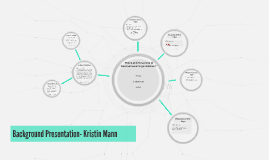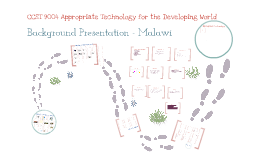Background Presentation
Transcript: Death rate 2012: 12.84 deaths/1,000 population (World ranking: 22) Infant (Child Mortality) Total: 79.02 deaths/1,000 live births (world ranking: 10) HIV/AIDS (2) Appropriate Technology Landlocked country Great African Rift Valley system: East – Lake Malawi South – mountains, tropical palm-lined beaches Mainly a large plateau, with some hills Lake Malawi (Lake Nyasa) Almost 1 million people have AIDS 60% of these are female Declining in urban areas, Rising in rural areas Leading cause of death amongst adults Contributes to the low life expectancy: 54.2 years 209th ranking (One of the lowest) 500,000 children have been orphaned due to AIDs Micro-finance Policy Framework and Strategies (Health SWAp) increasing the availability and accessibility of antenatal services; utilization of skilled health personnel during pregnancy, childbirth and postnatal period at all levels of the health system; strengthening the capacity of individuals and institutions to improve maternal and neonatal health; increasing the number of skilled health personnel; constructing and upgrading health facilities to offer essential health services particularly focusing on rural and underserved areas; and provision of ARVs and micronutrients during pregnancy. Geography of Malawi CCST 9004 Appropriate Technology for the Developing World Indicator 3: Literacy Rate of 15 – 24 year-olds According to the World Bank, microfinance is defined as: Microfinance is the provision of financial services to the entrepreneurial poor.This definition has two important features:it emphasizes a range of financial services—not just credit— and it emphasizes the entrepreneurial poor. Goal 2: Achieve Universal Primary Education Appropriate Technology: SIRDAMAIZE 113 Population: 16,777,547 (estimated in July 2013) Population growth rate: 2.758% (2012 est.) (World ranking: 18) Age structure Children: 50% of total population HIV/AIDS Human Resources Education Poverty Food Insecurity Erratic Rainfall Patterns/Droughts Corruption Lack of Foreign Investment Languages Indicator 5: Proportion of seats held by women in National Parliaments Central Region: 1-9 (Yellow) *Capital: Lilongwe Northern Region: 10-15 (Red) Southern Region: 16-27 (Green) Lake Malawi (Blue) Land surface area 45,747 square miles Challenges: · shortage of qualified primary school teachers; · inadequate physical infrastructure; · poor retention of girls mainly from standard five to eight; · high disease burden due to HIV and AIDS consequently leadinto absenteeism, especially among girls who take care of the sick · Poverty levels are high in rural areas. Malawi – Climate/Agriculture Trading partners: South Africa, Zambia, China, US Challenges: · shortage of qualified primary school teachers; · inadequate physical infrastructure; · poor retention of girls mainly from standard five to eight; · high disease burden due to HIV and AIDS consequently leading to absenteeism especially among girls who take care of the sick; and · poor participation of school committees and their communities in school management. · Poverty levels are high in rural areas. 1 Doctor per 50,000 people Hinders the ability to deliver medical services to people in need Reason: Emigration Lack of access to education Aggravated by AIDS > 4 nurses are lost each month This also affects other sectors: Government Business Farmers Human Resources HIV/AIDS - Contemporary GDP: US $14.58 billion (2012 est.) (World ranking: 142) Labor force: agriculture: 90%; industry and services: 10% (2003 est.) Countries main income Agriculture Main crops: maize, tobacco, tea, sugar cane, groundnuts, cotton, wheat, coffee, and rice Industry: tobacco, tea, sugar, sawmill products, cement, consumer goods Challenges: limited capacity in terms of human and material resources to facilitate adult literacy and continuing education; early marriages perpetuated by socioeconomic factors; socio–cultural factors that make people believe that men should be leaders while women are followers; and, poor learning environment which affects girls in primary and secondary schools e.g. sanitary facilities, long distances to education facilities, extra burden from domestic chores especially for adolescent girls resulting into high dropout rate. 1964: Independent from Britain Indicator 1: Maternal Mortality Ratio Malawi Demographics Problems - Outline Indicator 4: Share of Women in Wage Employment in the Non- Agriculture Sector measure of employment opportunities ( i.e equal proportions of men and women in formal employment) Yet, more women participate in the agriculture sector than in the formal wage employment especially in jobs that require professional qualifications. Due to: literacy levels, gender disparity and cultural values. Facts About the Product: Drought tolerant maize variant Able to mature under limited rainfall Suitable for marginal rainfall areas 136 days to mature Normally: 150 – 180 days Able to mature under limited rainfall Suitable for marginal rainfall areas

















